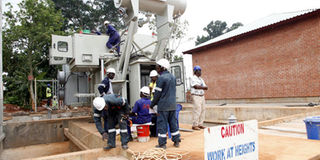Umeme issues Shs340b investment plan

Technicians work at the Kira sub-station. The sub-station is meant to reduce power losses, according to Umeme.
What you need to know:
Gains. The company says the move is meant to reduce power losses
Wakiso.
Power utility company Umeme is planning $100 million (Shs340 billion) investment in the next year to boost its capacity as more electricity is brought to the national grid.
Mr Selestino Babungi, the managing director, told reporters while touring the nearly completed 40 Megawatt substation in Kira that the investment would go towards new substations, prepaid metering and bringing down power losses.
“The new investment will go towards bringing down power losses to 17 per cent. We also need two substations and new feeder lines in Bugiri and Busia. Overall we are looking at a capital investment of between $80 million to $100 million in the next year,” he said.
Reduced power losses
The Kira substation was one of the investments in 2015, which cost $7 million (Shs24 billion) and is expected to serve about 30,000 customers in the Namugongo, Kira, Sonde and Buwate areas.
The line will also reduce power losses and save Umeme $4.5m (Shs15b) a year, company officials revealed.
Mr Babungi also revealed that in 2016, the utility company will be expanding its distribution capacity in the Namanve Industrial Park.
“We have also called for tenders for the expansion of our distribution capacity in the Namanve Industrial Park. Uganda Investment Authority is seeing some considerable growth in the industrial park from companies like Toyota, Roofings, Hima Cement, logistics companies and a transformer manufacturer, among others,” he added.
Umeme, in October, got a boost when power tariffs were increased to match the prevailing inflation and Shilling depreciation outlook.
With Isimba and Karuma projects coming online at least in the next five years, Umeme says it is increasing investment in order to match the capacity when the two dams are finally completed.
More financing
Umeme is currently negotiating with the World Bank and the KfW to access concessionary financing for investment in customer access projects across the country.
“This, in our view, would be a key positive development for the company, taking into account that it earns a guaranteed 20% return on investment while concessionary financing traditionally carries negligible rates.
“We believe this would allow the company to further step up its investment programme – value-creative by default taking into account guarantees of returns,” an investment note from Renaissance Capital reads.




